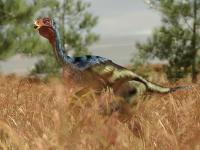T. Rex Bite is No Match for Finch Bird, Study Says
Research have found that the bite force of finch is about 320 times more powerful than T. rex.
Tyrannosaurus rex may have been known as a ferocious predator with extremely powerful bite but its biting ability becomes much less impressive when viewed in relation to its overall weight and size.
Researchers from University of Reading and University of Lincoln have showen that T. rex did not evolve any extraordinary bite to kill its prey. The prehistoric creature’s bite had a force of 57,000 Newtons that was completely average for its around 8-ton weight and the bone-crushing bite evolved gradually over tens of millions of years.
In fact, relative to their body size, a Galapagos ground finch outperforms T. rex. The tiny bird exerts 70N of force, despite weighing just 33 grams. It is about 320 times more powerful than the bite force of the T. rex.
Researchers say that Galapagos ground finch had, pound-for-pound, the most powerful bite force of of all the animals in the study and it evolved relatively quickly, in less than one million years.
"The image of T. rex with its fierce jaws has helped it become the most iconic of dinosaurs, but our research shows its bite was relatively unremarkable. Bite force was not what gave T. rex its evolutionary advantage, as was previously presumed,” said lead author Dr. Manabu Sakamoto, a biological scientist at the University of Reading.
"Large predators like T. rex could generate enough bite force to kill its prey and crush bone just by being large, not because they had a disproportionately powerful bite. This counters the idea that an exceptionally strong need for a powerful bite drove these ancient beasts to evolve bone-crushing bite forces."
Using their supercomputers, researchers analyzed the largest ever collection of bite force data from 434 species both extinct and surviving, including reptiles, birds and mammals. They have long suspected that animals with more powerful bites were forced to evolve rapidly. But analysis revealed that most of these animals developed proportionally to evolutionary changes to their body size over time. Accelerated evolution of bite force was observed in some animals, especially finches. In some cases, researchers even saw dramatic reductions in bite forces during evolution. For instance, the bite force of early humans decreased rapidly despite their body size increased over time.
“Our research provides new insight into the latest theories about the speed and drivers of evolution. It also allows us to create some fascinating hypothetical match-ups,” said co-author of the study Dr. Chris Venditti. “The proclaimed ‘King of the Dinosaurs’ would be no match for a finch in a fight, if they were the same size.”
Source: www.i4u.com









